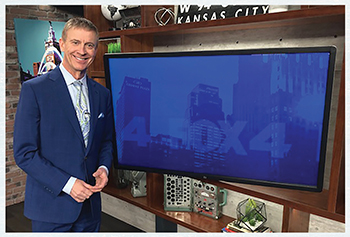Prostate Cancer Survivor
A Simple Message that May Save a Life
 In 2010, John Holt was happily married with two children in college and a fulfilling career as a Kansas City newscaster when he learned he had early-stage prostate cancer. The diagnosis wasn’t a complete surprise because of his family history, but he didn’t expect it at 51. Today, John is cancer-free. He credits preventive checkups and excellent medical care with his successful outcome and is committed to promoting the importance of early screenings.
In 2010, John Holt was happily married with two children in college and a fulfilling career as a Kansas City newscaster when he learned he had early-stage prostate cancer. The diagnosis wasn’t a complete surprise because of his family history, but he didn’t expect it at 51. Today, John is cancer-free. He credits preventive checkups and excellent medical care with his successful outcome and is committed to promoting the importance of early screenings.
As a newscaster, my job is to write and report the news. Although I’m often in the public eye, rarely is the spotlight on me personally. My cancer diagnosis, however, afforded me the opportunity to share my story and help men realize the critical importance of early screenings for prostate cancer.
Growing up in a medical household taught me the importance of prevention. My dad was a physician, and my mom made sure my siblings and I always went for our checkups. It’s a habit I kept up, and one that has made a dramatic difference in my life.
Because my grandfather and my dad were diagnosed with prostate cancer in their 60s, my doctor kept it on his radar screen to perform prostate exams and regular blood work annually. My PSA would rise and fall, but when it jumped enough to alarm him, he recommended a biopsy. I chose to have it done at a local teaching hospital known for its progressive cancer care. It also happened to be where my dad earned his medical degree. The anticipation of the biopsy was worse than the procedure itself. Still, I was confident I’d have good results. I was health conscious and symptom-free, so I didn’t expect to learn I had prostate cancer. The good news was that we’d caught it early.
My wife and I met with a wonderful urology oncologist at the hospital. He spent quite a bit of time discussing the treatment options, including radiation therapy or robotic surgery to remove my prostate. We talked about risks and potential side effects, which are something men are always concerned about. I was no different, but I took the attitude that I had to be alive to handle side effects, so they weren’t a deal breaker. My wife took notes during the visit because my mind was racing. After the appointment, I went to work, and she went home to do more research. She was (and is) amazing. Everyone needs someone to help with these practical tasks.
After learning more about the options, we leaned toward surgery with the da Vinci method because it appeared to have fewer complications, less nerve damage and a quicker recovery time. Also, my oncologist had extensive experience using the technique. It really sealed the deal when we asked his opinion, and he said, “If you were my brother, I’d tell you to get it out.”
Winter sounded like a good time to lie low in the house and recover, but my oncologist encouraged me to have the surgery sooner. He thought I’d enjoy recuperating in warm weather. I had the surgery in early summer, and it was a success. After the pathology results showed my Gleason score was actually a 7 instead of a 6 like we had thought after the biopsy, I was reassured I’d made the right decision to have a prostatectomy.
I went home with a catheter. Once that came out, I felt more like myself and really got my energy back. My doctor warned me to take it slow and not lift anything that could damage my internal stitches because it would require more surgery to fix them. Neither of us wanted that, so I followed his instructions to the letter.
I took several weeks off work. Because our news station had loyal viewers who would be concerned about my absence, my news director asked if I would write a blog for our station website about why I wasn’t on the air. I liked the idea for a couple of reasons. I felt extremely lucky that my cancer was caught early, and I knew that being aware of my family history and taking preventive action were instrumental in my successful treatment and recovery. I wanted to share the simple message that a blood test is all it takes for men to be proactive about their prostate health.
I wrote the blog during my recovery, and I immediately heard from men who had questions about my experience or wanted to talk with me about theirs. I also heard from women asking for advice about how to get the men in their lives to take action.
One message in particular made a lasting impression. David was younger than I when he was diagnosed with late-stage prostate cancer. His prognosis was grim, yet he was incredibly optimistic. He took part in clinical trials to help the process for men in the future. That contact grew into a friendship until he passed a few years ago, and it further emphasized the importance of early detection. Every diagnosis is unique, but early detection can often be that life-saving difference.
I’m cancer-free and involved with cancer advocacy through many organizations. And, of course, I have checkups to ensure I’m healthy and able to continue enjoying life with my wife, kids and grandkids.


